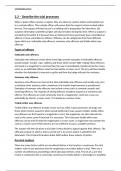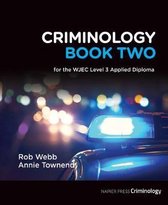Criminology unit 3
2.2 – Describe the trial processes
When a police officer arrests a suspect, they are taken to a police station and handed over
to a custody officer. This custody officer will ensure that the suspect is then treated within
the law. The suspect will then be put in a holding cell in preparation for interviews, the
suspects information and DNA samples will also be taken during this time. When a suspect is
arrested by the police it is because they are believed to have previously have committed an
offence or have committed an offence. Offences can be categorised into three different
types which are: indictable only offences, summary only offences and triable either way
offences.
Types of offence
Indictable only offences
Indictable only offences crimes which have high severity examples of indictable offences
would include: murder, rape, robbery and those which involve GBH. Initially these offences
are heard in a magistrate's court but then the case is immediately transferred to the crown
court, as an indictable offence must be tried within a Crown court. The jury will then decide
whether the defendant is innocent or guilty and then the judge will pass the sentence.
Summary only offences
Summary only offences are less serious than indictable only offences and usually only carry
a relatively short sentence with a maximum of 6 months imprisonment as punishment.
Examples of summary only offences may include crimes such as common assaults and
motoring offences. The majority of driving offences would be classed as a summary only
offence. The offences are most commonly tried in a magistrates’ court but a case can
potentially be tried in a crown court, if it related to a serious crime.
Triable either way offences
Triable either way offences include crimes such as: theft, fraud, possession of drugs and
those which involve assault in which actual bodily harm was caused. Initially, triable either
way offences are first heard in a magistrate's court, the magistrate can then allocate the
case to the crown court if they feel it is necessary. This is because triable either way
offences can be tried in both the magistrates or crown court. A magistrate may transfer the
case to a crown court if their powers are not sufficient to pass a suitable sentence.
The suspect will then be given a trial date is they decide to appeal against their offence. The
ultimate purpose in which a trial is carried out is to ensure justice is upheld for the
defendant. The Criminal Procedure Rules 2020 outline these aspects of justice.
Pre-trial matters
There are many factors which are considered before a trial reaches a courtroom. Pre-trial
matters refer to any decisions that the magistrates court takes before a trial. There are a
number of preliminary proceedings which take place before a trial. First of all, a pre-trial
review is conducted, this is commonly carried out 10 weeks before a trial begins to establish





